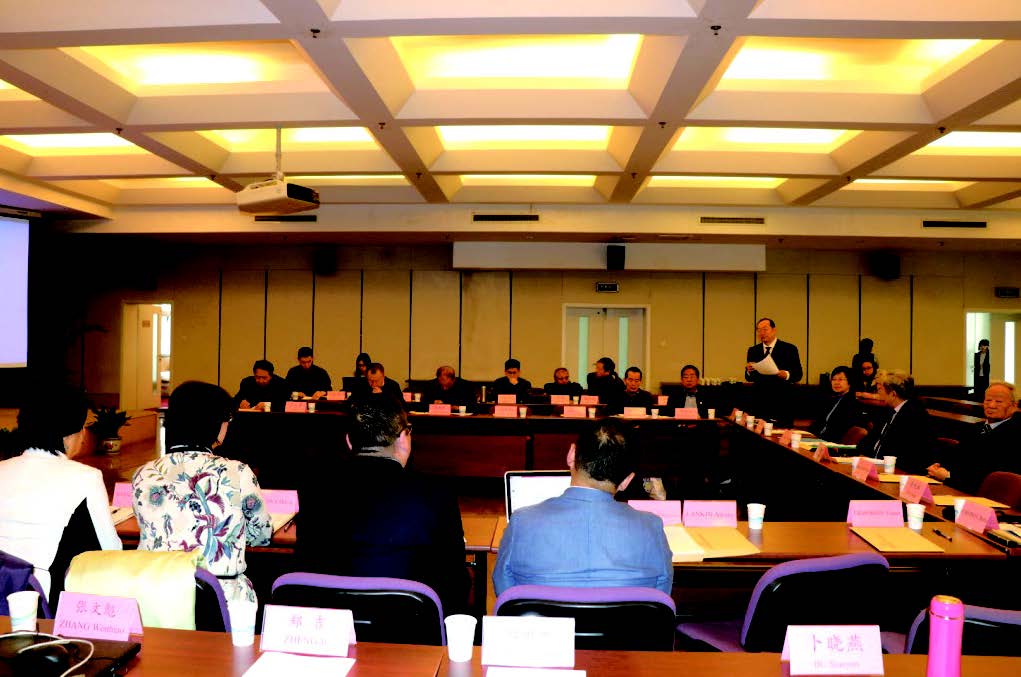Pan-TPE hosted Ecological Risks and Sustainable Development of the China-Mongolia-Russia Economic Corridor International Symposium
Author :wangwc
2018-11-12 17:09
The Ecological Risks and Sustainable Development of the China-Mongolia-Russia Economic Corridor International Symposium was hosted successfully in the Institute of Geographic Sciences and Natural Resources Research, Chinese Academy of Sciences on 6th November 2018. More than 50 experts from Chinese Academy of Sciences, Russian Academy of Sciences and Mongolian Academy of Sciences, Beijing Jiaotong University and Inner Mongolia University of Finance and Economics participated in the conference, and the ecological risks and sustainable development problems of the China-Mongolia-Russia Economic Corridor were deeply discussed.
The symposium was supported by the Project “Eco-environment Problems and Countermeasures of the China-Mongolia-Russia Economic Corridor” of the Strategic Priority Research Program of the Chinese Academy of Sciences “Environmental Change and Green Silk Road Construction of the Pan-Third Pole”, the National Social Science Found of China “Strategic Research Project on One Belt and One Road”, the Key International Cooperation Project of Chinese Academy of Sciences and the National Key R&D Program of China “Multi-disciplinary Joint Expedition of the China-Mongolia-Russia Economic Corridor”, and hosted by Professor Dong Suocheng.
The welcome speech was delivered by Ge Quansheng, the director of the Institute of Geographic Sciences and Natural Resources Research, Chinese Academy of Sciences, and he proposed that the Institute of Geographic Sciences and Natural Resources Research will support international cooperation of the China-Mongolia-Russia Economic Corridor actively. Academician Sun Jiulin and Professor Dong Suocheng organized series of expedition research on the China-Mongolia-Russia Economic Corridor and achieved great results and outstanding progress. It provided important scientific and technological support to the protection against the ecological risks and joint construction of the green One Belt and One Road. Academician Li Wenhua, the project consultant, believed that the cooperation of the scientists from China, Mongolia and Russia was of deep significance. This region was special and important. There will be many problems and challenges during the research process. Academician Li Wenhua hoped that all experts confirm their confidence and provide scientific support for the construction of the safe barrier of the China-Mongolia-Russia Economic Corridor. Academician TULOKHNOV Arnold, from the Institute of Baikal Nature Management Siberia Branch of RAS, pointed that the Russian Academy of Sciences has cooperated with Chinese scientists for more than ten years, and the ecological risks and green development are the realistic scientific problem that we all pay attention. Professor BATTOGTOKH Dorjgotov, the Director of the Institute of Geography and Geoecology Mogolian Academy of Sciences, hoped to have further cooperation improvement with the world’s scientists in the fields of the sustainable development of the agriculture, tourism and green industry.
Prof. DONG Suocheng from Institute of Geographic Sciences and Natural Resources Research of CAS reported on the main ecological environment problems and countermeasures of transportation and pipe lines construction in China-Mongolia-Russia Economic Corridor. He pointed out that climate change and human activities will aggravate the risk of desertification and permafrost disasters in the economic corridor of China, Mongolia and Russia, which have a far-reaching impact on the layout and safety of transportation and pipelines. The three countries should strengthen cooperation, carry out technical experiments and demonstrations, and seek comprehensive countermeasures. Academician TULOKHONOV Arnold from Baikal Institute for Nature Management, Siberian Branch of RAS introduced "Deep water manned vehicles «Mir» on lake Baikal and Lake fluctuations". He pointed out that underwater pollutants will have an impact on global warming. It is the common responsibility of Russia and the people of the world to strengthen the protection of Lake Baikal. Academician BAKLANOV Petr who is the Director ERMOSHIN Victor and Prof. LANKIN Alexey, Pacific Geographical Institute of RAS. He reported on Main Directions of Development of Transport Networks in the East of Northern Eurasia based on the factors of population distribution, industrial distribution and climatic conditions from 1926 to 1939 to 1999.Academician VORONOV Boris from Khabarovsk Institute of Water and Ecology Problem of RAS gave a presentation of Ecological-geographical and socio-economic aspects of the formation and the functioning of the Chinese-Mongolian-Russian economic corridor. He said achieving dynamic adaptation between social and economic development and ecological carrying capacity is conducive to the realization of multi-factor sustainable development. Prof. WANG Yanfen who is Executive President of University of Chinese Academy of Sciences reported on Research on spatial pattern of Eurasian grassland. Prof. KRIUKOVA Mariia who is Executive Director General of Khabarovsk Institute of Water and Ecology Problems of RAS, gave a speech on Protected natural areas as a basic element of the environmental policy of the Khabarovsk Krai.Prof. BATTOGTOKH Dorjgotov who is Director General of Institute of Geography-GeoEcology of MAS studies on Mongolian sustainable development vision 2030: Competitiveness of the industrial sector and clustering. Prof. ZHANG Shuwen and Assistant Prof. YU Lingxue from Northeast Institute of Geography and Agroecology of CAS reported on The effects of snow cover changes on regional radiation budget and temperature.
The China-Mongolia-Russia Economic Corridor is the first substantive construction of the six corridors of One Belt and One Road. The forewarn and countermeasures to the eco-environment risks, ecological economic and green development mode are of strategic significance. The experts from China, Mongolia and Russia enhance the cooperation, and ensure the key fields and points of the cooperation through this international symposium. The symposium reflects the concept of scientific community promoting the co-build, co-share and win-win cooperation of the destiny communities.

